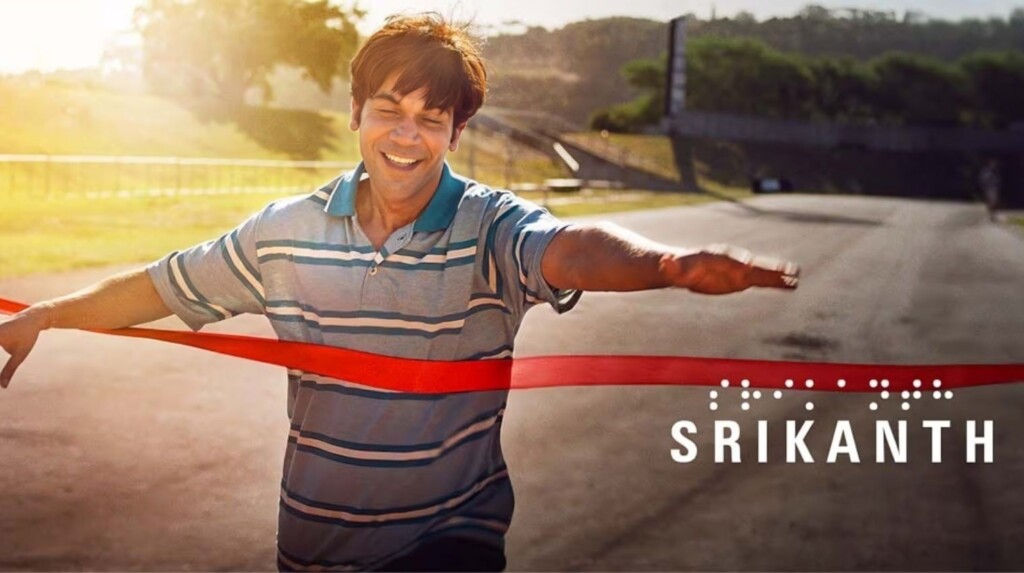Srikanth Review: The lead actor has exceptional support from Jyothika and Sharad Kelkar – both are epitomes of restraint in keeping with the sustained balanced timbre of the drama.
Rajkummar Rao delivers an exceptionally skilled performance in Srikanth, portraying both a teenager and a twentysomething with great effort. This Bollywood biopic stands out from the rest by avoiding excessive melodrama to highlight the achievements of the visually impaired protagonist.
Under the direction of Tushar Hiranandani, known for his successful works like Saand Ki Aankh and Scam 2003, Srikanth tells the inspiring true story of Srikanth Bolla, an industrialist who rose from poverty, attended MIT, and returned to India to establish a unique corporate entity.
Srikanth is a classic tale of overcoming adversity, elevated by the director’s decision to steer clear of clichés. The storytelling remains straightforward and precise, with the cinematographer and editors executing their roles flawlessly without overshadowing the narrative.
The blind protagonist faces numerous challenges, from discrimination to bullying and an education system that limits opportunities for differently abled individuals in the field of science, even with the required qualifications.
Despite an overly dramatic opening sequence, the screenplay by Jagdeep Siddhu and Sumit Purohit avoids excessive sentimentality throughout the film.
In the pivotal courtroom scenes, Srikanth, accompanied by his teacher Devika, faces the challenge of convincing a judge, a college principal, and a skeptical lawyer that he deserves equal opportunities despite his physical abnormalities. The film cleverly maintains its moderate tone while advocating for individuals like Srikanth. However, there are moments when the film tends to state the obvious instead of leaving room for audience interpretation, such as when Srikanth’s father repeats a significant act from earlier in the film.
Srikanth’s story showcases his exceptional vision and determination, but it also highlights the delicate moments in his life where his self-confidence borders on arrogance and success leads to indifference. These moments of weakness strain his relationships with key people in his life, including his girlfriend Swathi, whom he initially connects with on social media before meeting at MIT, where he attends on a full scholarship.
While the film presents a compelling portrayal of Srikanth’s unwavering pursuit of his goals and his mission to uplift others facing physical and economic challenges, it also acknowledges the flaws that threaten to alienate his true supporters.
Srikanth finds solace in the musical refrain of “Papa kehte hai bada naam karega” from Qayamat Se Qayamat, but his focus shifts from the hero’s father to a teacher named Devika who mentors him and teaches him to overcome challenges.
Devika acts as a guiding force for Srikanth, allowing him to dream freely, while Ravi, an investor and friend, supports his ambition to establish his own business.
Although Srikanth rarely apologizes, he expresses gratitude in his own way, recognizing the support he receives and his unwavering self-belief. His internal conflicts are a result of his difficult past.
The film highlights the influence of former President A.P.J. Abdul Kalam’s “Lead India” campaign on Srikanth, motivating him to pursue his dreams. However, a negative encounter with a politician teaches him valuable lessons about taking shortcuts.
Srikanth’s unique ability to ‘see’ beyond physical sight is a central theme in his journey. Despite facing challenges, he remains determined to dream big, resisting attempts to limit his aspirations by Ravi.
Srikanth finds solace in the musical refrain of “Papa kehte hai bada naam karega” from Qayamat Se Qayamat, but his focus shifts from the hero’s father to a teacher named Devika who mentors him and teaches him to overcome challenges.
Devika acts as a guiding force for Srikanth, allowing him to dream freely, while Ravi, an investor and friend, supports his ambition to establish his own business.
Although Srikanth rarely apologizes, he expresses gratitude in his own way, recognizing the support he receives and his unwavering self-belief. His internal conflicts are a result of his difficult past.
The film highlights the influence of former President A.P.J. Abdul Kalam’s “Lead India” campaign on Srikanth, motivating him to pursue his dreams. However, a negative encounter with a politician teaches him valuable lessons about taking shortcuts.
Srikanth’s unique ability to ‘see’ beyond physical sight is a central theme in his journey. Despite facing challenges, he remains determined to dream big, resisting attempts to limit his aspirations by Ravi.
Rajkummar Rao portrays the character of Srikanth with great depth and authenticity, capturing the essence of his journey from adolescence to young adulthood. Despite the challenge of playing a teenager, Rao’s performance is remarkable in its portrayal of physical limitations, dialogue delivery, and body language. Jyothika and Sharad Kelkar provide excellent support, maintaining a sense of restraint that complements the overall tone of the film. “Srikanth” is not just a narrative, but a touching tribute to a unique perspective on life that deserves a broad viewership.
